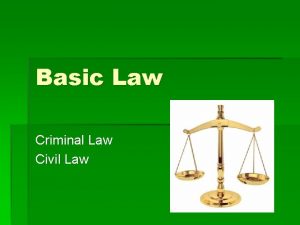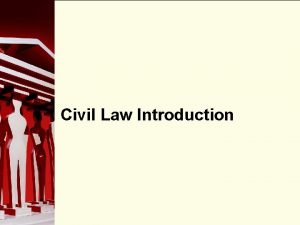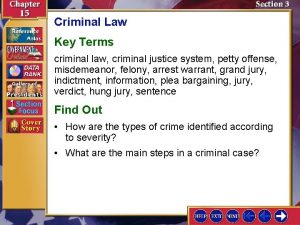Criminal and Civil Law Criminal Law Definition a







- Slides: 7

Criminal and Civil Law

Criminal Law Definition: a. 1. Crimes that are committed against any member of society. The offender is brought to court by the Crown. (i. e. murder, kidnapping, assault, theft)

Three criteria for an act to be considered a crime: b. 1. 2. 3. Canada’s laws must say that it is wrong to commit the act and it is criminal There must have been intent The offender must be able to understand what they did and the consequences of the act

Criminal law is divided into 3 categories: c. Summary Offences 1. § Minor or less serious offences (shoplifting, petty theft, etc. ). The most severe sentence is $2000 and/or 6 months in jail Indictable Offences 2. § Much more serious crimes (drugs, murder, assault, extortion). Need to show there is enough evidence to bring the offender to trial

Hybrid Offences 3. § The crown may decide if a crime will be treated as a summary offence or an indictable offence

Civil Law Definition: a. 1. 2. A legal dispute between private individuals or groups and an offender is brought to court by another individual. Examples: family disputes, employment disputes, injury cases, contract disputes

Differences between civil and criminal cases: b. 1. 2. 3. 4. Almost always decided by a judge Judge can award money to the plaintiff (victim of the crime) The guilty person cannot be sent to prison The burden of proof in a civil case is not as strict as it is in a criminal case













